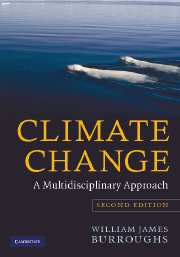Book contents
- Frontmatter
- Contents
- Preface to the second edition
- 1 Introduction
- 2 Radiation and the Earth's energy balance
- 3 The elements of the climate
- 4 The measurement of climate change
- 5 Statistics, significance and cycles
- 6 The natural causes of climate change
- 7 Human activities
- 8 Evidence of climate change
- 9 Consequences of climate change
- 10 Modelling the climate
- 11 Predicting climate change
- Glossary
- Bibliography
- Index
3 - The elements of the climate
Published online by Cambridge University Press: 05 June 2012
- Frontmatter
- Contents
- Preface to the second edition
- 1 Introduction
- 2 Radiation and the Earth's energy balance
- 3 The elements of the climate
- 4 The measurement of climate change
- 5 Statistics, significance and cycles
- 6 The natural causes of climate change
- 7 Human activities
- 8 Evidence of climate change
- 9 Consequences of climate change
- 10 Modelling the climate
- 11 Predicting climate change
- Glossary
- Bibliography
- Index
Summary
I am the daughter of Earth and Water,
And the nursling of the Sky;
I pass through the pores of the ocean and shores;
I change, but I cannot die.
Percy Bysshe Shelley, 1792–1822In understanding what constitutes climate variability and climate change and predicting how each may evolve in the future we need to have a clear idea of which aspects of the climate matter. This is crucial as these fluctuations are not simply a matter of the Earth as a whole warming up or cooling down, or even of certain regional climates (e.g. deserts) expanding or contracting. The physical processes described in Chapter 2 may drive the mechanics of change, but the network of links within the system complicates how they combine with the different components of the climate. The objectives of this chapter are therefore to establish what are the most important components of the climate, and to identify the strongest links between them, so we can have a framework for examining the essential aspects of climate variability and climate change.
The atmosphere and oceans in motion
How the atmosphere and the oceans transfer energy around the globe is the key to climate studies. It is also central to the sciences of meteorology and climatology. There are a lot of more than adequate books on these subjects (see Bibliography) and so many of the physical fundamentals or details of the Earth's climate will not be regurgitated here.
- Type
- Chapter
- Information
- Climate ChangeA Multidisciplinary Approach, pp. 36 - 80Publisher: Cambridge University PressPrint publication year: 2007



